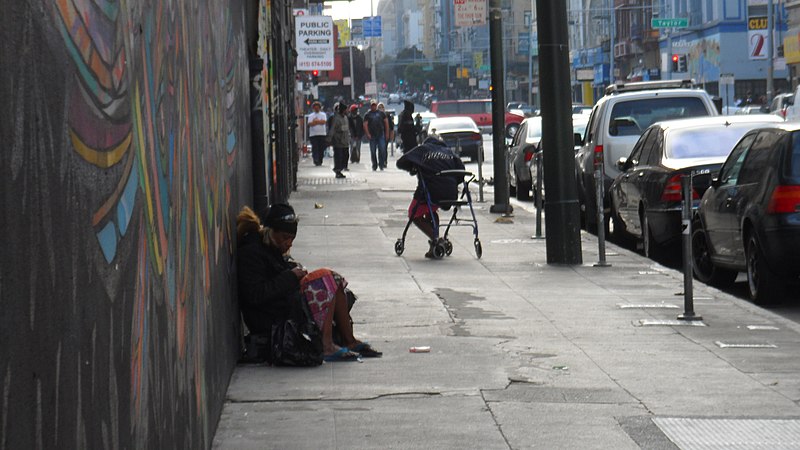What Does Homelessness Look Like?
It might be far different from what you think
JCruzTheTruth, Wikimedia commons, public domain
Although people might picture homelessness as this person in San Francisco on September 23, 2012, there are far more faces of homelessness that people do not see.
Imagine your day. You go to school. You come home and settle in for a relaxing evening in your bed in front of the TV. Maybe you spend time on social media posting pictures of your new clothes. Maybe you cook a nice meal or order takeout. Maybe you then tackle some homework on your laptop before going to sleep.
Now, picture spending your day and night waiting. Waiting to go to school for your next meal. Waiting for money to buy clothes. Waiting to find a hotspot for wifi. Waiting for help. Waiting to be acknowledged. Waiting for comfort.
This is a reality for students all around the United States. Homelessness is an ongoing issue and a reality for over 500,000 Americans today. These statistics prove that the privileges that many have been given are not offered to everyone.
Those who are homeless tend to suffer under a stigma, while those who live in comfort often assign blame to the homeless for their situations. Often people justify turning a blind eye to homelessness, or they blame substance abuse or laziness for the living standards of those in need. This, however, is far from the truth.
According to a 2015 report by the National Law Center on Homelessness & Poverty , the top causes of homelessness for families are a lack of affordable housing, unemployment, poverty, and low wages, in that order.
The same report also stated that among homeless individuals, the leading causes are similar to those of homeless families, but they also included mental health, substance abuse, and lack of services.
Once aware of the causes of homelessness, any excuse not to help those in need is ignorance. Although substance abuse and some personal choices can lead to homelessness, there are other reasons like unemployment that cause this.
Stigmatisms about homelessness only worsen the growing shame. Homelessness takes many different forms, and just because it is not obvious does not mean it is not there.
Martin Luther King Jr. said, “Life’s most urgent question is: What are you doing for others?” So, what are you doing for others? Everyone has the power to be that voice. You or I may not be able to say that we know what it is like to be homeless. But that does not mean we can pretend it does not exist.
I often feel foolish and disgusted with myself when I consider some of the things I become tied up in while there is so many hardships all around me. Clothing, social media, sports, grades, comfort. All things I, and I assume my peers, become obsessed with while people are outside waiting for their next meal or a warm night.
Next time you become entrapped in the materialism of our modern world, I urge you to put your situation in perspective. Are you employed? Are you healthy? Do you have shelter? Food? Company? If any of these answers are yes, first, gratify yourself. And second, find out how to share these blessings.
Small donations, volunteering, service projects, and having conversations are all ways to help.
To learn more, including where to donate, volunteer, or spread the word of advocating for homelessness, click below:

Abby Joyce is a member of the class of 2021. Joyce is entering her fourth year on the Green Wave Gazette and is Editor-in Chief after attending a journalism...


Susan Crowley • Nov 25, 2020 at 7:54 AM
This was a great article that helps us become aware of the struggles that many face and makes us appreciate the things we take for granted.
Elizabeth Gonsalves • Nov 24, 2020 at 3:42 PM
Abby, as we read The glass Castle in grade 9, we are called to think about what it means to experience poverty & homelessness, what it means to be one of the working poor. Thank you for echoing Dr.King’s call to do something! Thank you writing this article that makes homelessness real. We can all do something to make a difference.